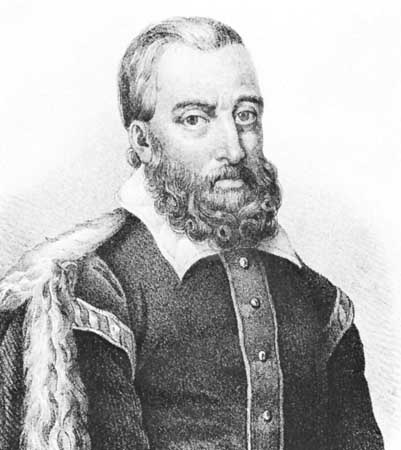Barros, João de
Portuguese historian
born c. 1496, , Viseu?, Port.
died Oct. 20, 1570, Ribeira de Litém, near Pombal
 Portuguese historian and civil servant who wrote Décadas da Ásia, 4 vol. (1552–1615), one of the first great accounts of European overseas exploration and colonization.
Portuguese historian and civil servant who wrote Décadas da Ásia, 4 vol. (1552–1615), one of the first great accounts of European overseas exploration and colonization.Barros was educated in the household of the Portuguese heir-apparent and became a good classical scholar. His chivalrous romance Crónica do Imperador Clarimundo (1520) induced King Manuel I of Portugal to encourage Barros in his idea of writing an epic history of the Portuguese in Asia. But first he wrote several moral, pedagogical, and grammatical works, including Rópica pnefma (1532; “Spiritual Merchandise”), the most important philosophical dialogue of the time in Portugal, and an elementary Portuguese primer-catechism (1539) that became the prototype of all such works.
In 1522 the succeeding king, John III, sent Barros to Guinea (in western Africa), and soon after his return he was appointed treasurer (1525–28) and then factor of the Casa da India e Mina (1533–67), a post corresponding to crown administrator of the Portuguese colonies in Guinea and India. It was in this period that Barros wrote Décadas da Ásia, an epic historical account of Portuguese discoveries and conquests in the Orient to 1538. In compiling his chronicle, Barros used his official position to consult returned soldiers, merchants, and administrators and peruse all the official correspondence, while he himself was personally involved in the dispatch and return of the annual India fleets.
He finished the first draft in 1539; the first volume was published in 1552, with subsequent volumes appearing in 1553 and 1563. The last volume, which appeared posthumously in 1615, covered the period from 1539 to the end of the century and was edited and written by Diogo do Couto. Barros' other works on geography, commerce, and navigation disappeared after his death.
- Port Huron
- Portici
- portico
- Portion of the periodic table of elements related to semiconductors
- Port Jackson
- Port Kelang
- Portland
- portland cement
- Portland Inlet
- Portland, Isle of
- Portland State University
- Portland Vase
- Portland, William Henry Cavendish Bentinck, 3rd Duke of, Marquess Of Titchfield, Earl Of Portland, Viscount Woodstock, Baron Of Cirencester
- Portlaoise
- Port Lavaca
- Port Lincoln
- Port Louis
- Port Macquarie
- portmanteau word
- Port Maria
- Port Morant
- Port Moresby
- Portneuf River
- Port Nicholson
- Port Nolloth